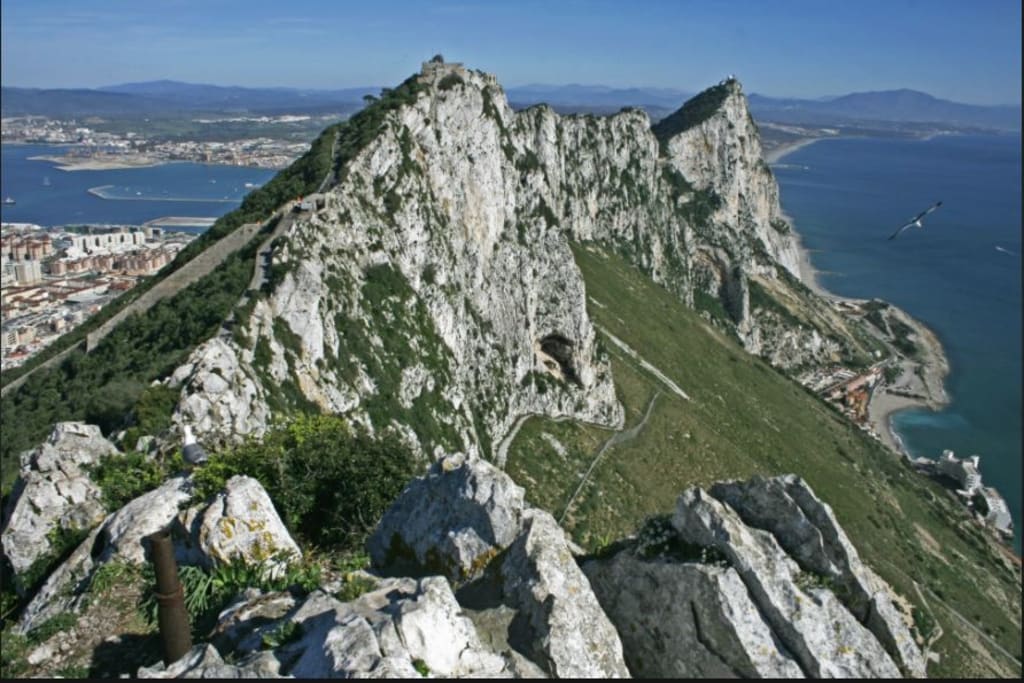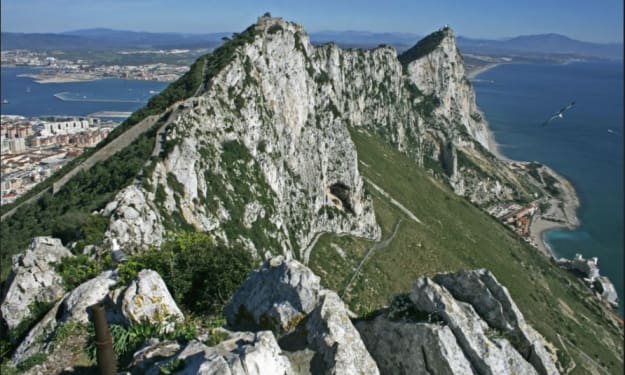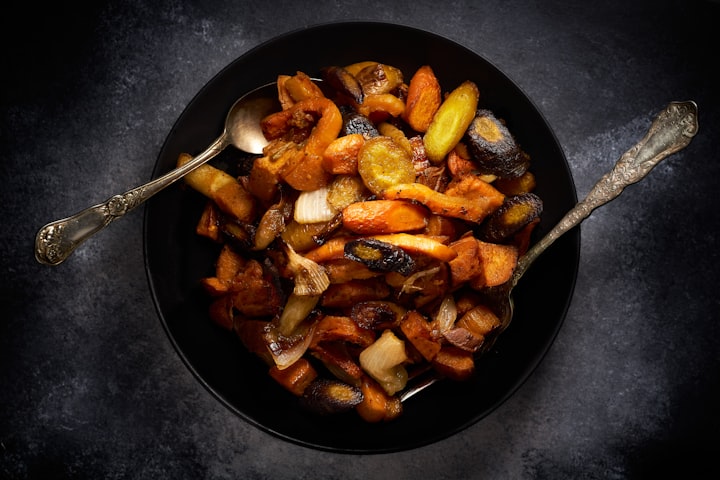The Rock of Gibraltar, Part 1
An orphan and the aunt who raises her both struggle with their senses of self.

*Originally published in Angie's Diary, September 2019*
There’s a long list of things that are more pleasant than being on I-95 in Massachusetts during rush hour.
None of them are appropriate to say out loud, but I’m sure my Aunt Louise was thinking of a few of them on one Friday afternoon during my early childhood, as we moved at two miles an hour down the clogged, concrete artery of the state we called home.
“Look at this mess.” She huffed, gesturing towards the windshield.
“Maybe they’re all going to look at the leaves.” I was six, and to me, that was the most logical explanation for all the congestion.
It was late October, and almost all the trees had finished throwing Molotov cocktails into the skyline. Sometimes, my aunt and I would drive to the more rural parts of Massachusetts or even as far as New Hampshire or Connecticut to go leaf-peeping.
Depending on where we were, there would also be farm stands that sold cider donuts or caramel apples, which we’d eat under the orange glow of the foliage. Days like that didn’t come often, though, as they required my aunt to both be off of work and me to have been “good,” whatever that meant.
“This is gonna take another hour, easy.” My aunt sighed. “At least the brothers don’t care how late we get in.”
The Rumford brothers, or “the brothers,” as we called them, all lived together in the same small town that my father and aunt had grown up in. Ben, the oldest brother, had been friends with my father in high school, and his younger twin brothers Ritchie and Marcus had been classmates of my aunt’s.
Even after my father and aunt graduated and began their separate adult lives, they stayed in touch with the Rumford family, and when my mother and father had both been snuffed out by a drunk driver while on their way to pick up a then two-year-old me from Aunt Louise’s house, the brothers showed more support than some of our own blood relatives did. One of the ways they did that was to open their house to my aunt (who worked as a home health aide) and I to stay the night in, whenever she was assigned to care for a patient who lived in their neck of the woods, as she had been during this particular weekend.
“There’s a hole in my jeans,” I whined, as I ran my pointer finger up and down my thigh.
“That’s in style these days.” My aunt answered, eyes focused on the road. That was technically true, as the nineties were on their way out, but I wasn’t following a trend.
“I want new jeans.”
“I’ll sew the hole up later. Do you think I’m made of money?”. She answered, slightly pained. Much of my clothing – including those jeans – were hand-me-downs from the other kids who lived in our apartment building, and most of my toys and jewelry had once belonged to my parents, like my father’s old stuffed panda and my mother’s silver charm bracelet that I was wearing on my left wrist that day. I loved wearing my mother’s jewelry and playing with my father’s toys; doing so made me feel connected to them. But my aunt wanted better for herself and especially for me, and the fact that “better” always seemed to be out of her reach stung her like a red-hot welt.
“No,” I answered, puzzled at the question. Aunt Louise was certainly not made of money; there was not a single dollar bill or coin on her body. “You’re made of meat and bones.”
“Meat and bones, huh?” She chuckled.
“Uh-huh.” I nodded. “And water. Lots of water.”
“My silly girl.” Aunt Louise said affectionately. I scowled; she may have found what I said amusing, but there’s no better way to get under a child’s skin than to treat their serious thoughts like a set at a comedy club.
“I am not silly!” I crowed. My aunt whipped around, with a face made of stone.
“Watch yourself, Juliana.” She said through clenched teeth. Then, she turned back around and smirked.
“Incredible. You’re incredible.”
I looked out the window, consciously trying to avoid meeting her eyes. I was “incredible” when I folded my clothes all by myself or showed her that I could count to twenty, but I was also “incredible” when I mouthed off or made a fuss. She threw that word around often when I was little, without explaining the many shades of its meaning. I didn’t feel like talking to her, so for the remainder of the tense drive, I repeated it to myself under my breath – this nebulous, colorless word that wandered without direction like a confused tourist in a new city – until I grew tired.
We finally pulled up to the brothers’ house, a tiny manila folder-colored ranch, just as the sun had started to dim its light. Ben was hammering nails into a wooden birdhouse, while Ritchie and Marcus were washing the family truck (which bore the logo of “Rumford and Sons”, the auto repair company they had inherited from their father). When Ben heard our car, he looked up, smiled, and motioned for the other two to come closer. After Aunt Louise had unbuckled me, I ran over to them, leaving her following wearily behind.
“Hey, sister!” Ben cried out, calling me by the nickname the men had given me when I was a toddler. He bent down to hug me, and his brothers did the same. He looked like a renaissance fair actor, with his floppy chestnut hair and thick beard. The twins both wore glasses and of course, resembled each other, but Marcus had stubble sprinkled across his cheeks, and Ritchie couldn’t grow facial hair to save his life. They were no-frills, salt-of-the-earth folks, and I enjoyed visiting them.
“How old are you now?” Ritchie asked. I showed him six fingers.
“Oh, my goodness.” He gasped. “I remember when you were just a baby.”
“We’re getting old.” Marcus smiled and shook his head. Ritchie and Marcus were just a few months younger than Aunt Louise, which meant that back then, they were only forty-seven. But of course, to a child as young as I was, forty-seven may as well be seventy-four.
“How old are you?” I asked innocently.
“Juliana!” Aunt Louise snapped. She then turned to the twins, who were both laughing. “I’m sorry; she can be so rude sometimes.”
“She’s not rude; she’s just curious,” Marcus said, and though I should have felt better after hearing that, I didn’t know whose assessment of my personality was the correct one.
“Marcus and I are your aunt’s age.” Ritchie put his arm around Aunt Louise, who was limp with fatigue. “She was in our grade. One of the sweetest girls you could ever know.”
A shy smile spread across my aunt’s face. I didn’t say anything; to me, “sweet” and “Aunt Louise” didn’t belong together, and I could only see her as a perpetually worn-out lieutenant who seemed like she couldn’t go two hours without chastising me for something.
“Come inside and kick your feet up, Lou.” Ben guided my aunt towards the door. “Have you two already had dinner?”.
“I haven’t, but she has.” She eyed me. “It’s about time for her to go to bed.”
“No!” I had already taken a short nap in the car and had no interest in going to bed. I sat down on the lawn and crossed my arms in protest.
“I swear, kid, you are the Rock of Gibraltar.” My aunt tried in vain to help me stand up.
“That’s a good thing,” Ben said, noticing the look of befuddlement on my face. “It means you’re strong.”
“It can also mean that she’s a stubborn pain-in-the-booty.” My aunt tried to lift me up again, but I wouldn’t budge.
“Come here, you.” I heard Marcus say, and two seconds later, I was hanging partially upside-down in his arms. After some joyful squealing on my part, he held me right-side-up.
“I figured you’d like that,” Marcus said, as Ritchie unlocked the door to let everyone in. “I know you.”
That didn’t seem possible to me, as I barely knew myself. But I didn’t want to risk getting reprimanded again, so I swallowed my urge to argue, and let him carry me into the house.
The following day, Aunt Louise had to work in the afternoon, whereas the brothers had to work in the morning. Ben suggested taking me to the pond right behind their house, so as soon as we finished breakfast, my aunt and I were out the door, walking along the dirt trail that led to a wide circle of sparkling green water that was lined by a man-made beach. No one else was there, except for one older lady who had parked herself in a lawn chair near the shore.
We had borrowed a blanket from the brothers, which my aunt spread out for us to sit on. A crisp breeze patted us on the shoulders. It wasn’t strong, but it was more than my thin jacket could shield me from. I had often seen parents cradle their young children on television, and at that moment, that’s all I craved; Aunt Louise never really hugged me much, unless I wasn’t feeling well, and even then she would act like she was holding a wet frog. She was shivering herself, and I could tell that we were both dying to feel each other’s warmth. She inched towards me, and I brought my head down, in slow motion, onto her shoulder.
We stayed that way for about ten minutes, without speaking; words mean very little out in nature, where trees release relaxed breaths, and little birds sing arias that hold more weight than stray bullets fired from the mouth. But I cracked the quiet when I noticed a mother and baby sparrow pecking furiously at a decrepit, soggy Oreo at the water’s edge.
“Look!” I pointed to the scene and watched for her reaction. Surprisingly, she softened a little.
“Mama bird, baby bird.” She brushed my hair out of my face and leaned in closer to me.
“When you were a baby, your parents and I used to bring you to Boston Common, and I remember you would run – well, waddle – after every pigeon you saw. We all had to chase after you; the minute we took our eyes off of you, you’d go flying around the park.”
“Really?” I had only known my father and mother – a stout, mustachioed guy and a freckled blonde – from old photographs, but the thought of them and my aunt running after baby me as I terrorized birds made me giggle.
“Yes.” Her eyes laughed with the memory. “But you were so cute. We couldn’t have gotten mad if we tried.” She then became somber and stared at the pond.
“Gone.” Aunt Louise shook her head sadly and exhaled. “All gone.” I couldn’t tell if she was talking about the loss of my mom and dad, or the death of the just-learned-to-walk, drooling me that was too pure to upset her. Both options involved things I didn’t remember, yet they gave me a mournful, bottomless ache in the pit of my stomach.
“But you’re my new mama, right?” I asked her the question that had been nibbling at my spirit for eons, and she froze. Aunt Louise had cooked every meal for me, styled my hair each morning, treated my bumps and bruises and other painful scout badges of childhood play – all for longer than my mother had – and yet the m-word still felt like an overcoat that was three sizes too big on her......
(To be continued.....)
About the Creator
Sharisse Zeroonian
Writer/Filmmaker/TV Producer/Long-Suffering Teacher/Potential Grad Student
"but all my words come back to me, in shades of mediocrity"





Comments
There are no comments for this story
Be the first to respond and start the conversation.